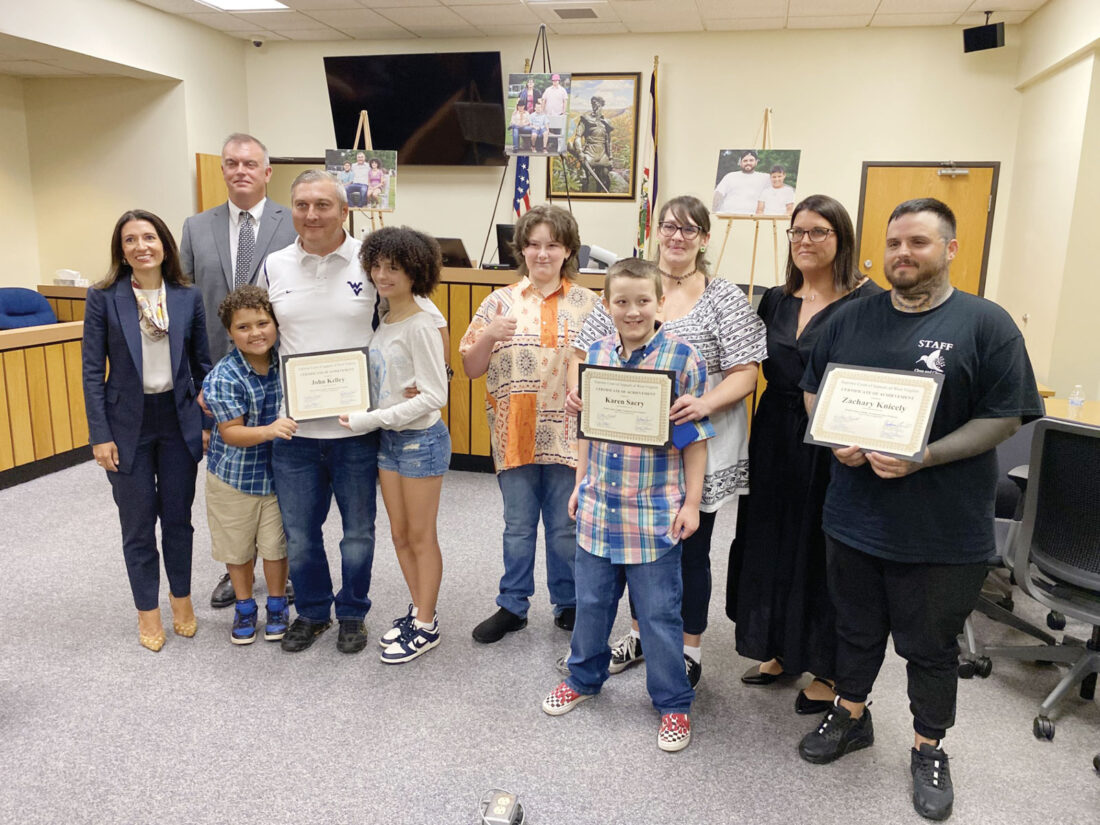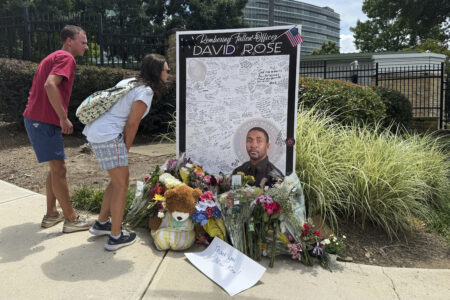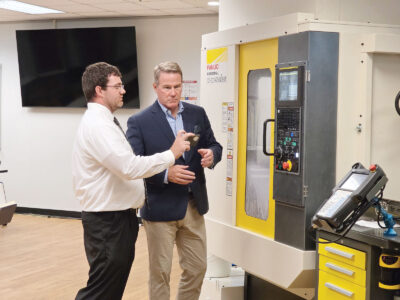Three complete Wood County Family Treatment Court program

Justice Haley Bunn of the West Virginia Supreme Court, Wood County Circuit Judge Jason Wharton and the families of John Kelley and Karen Sacry and Zachary Knicely, as well as Cheri Christman, the Family Treatment Court Case coordinator, were present Monday for a graduation ceremony for Kelley, Sacry and Knicely for completing the Family Treatment Court program. (Photo by Brett Dunlap)
PARKERSBURG — Three individuals took a big step Monday in regaining control over their lives and building stronger family ties with their loved ones.
The Wood County Family Treatment Court held a graduation ceremony Monday for three people who completed its program, which was also attended by members of their family, court personnel and Justice Haley Bunn of the West Virginia Supreme Court of Appeals.
Those graduating from the program were Zachary Knicely, John Kelley and Karen Sacry.
Wood County Circuit Court Judge Jason Wharton, the Family Treatment Court judge, said they were there to celebrate the three people who completed the program.
“These are three parents who have shown what it takes to change a life, not just their own, but the lives of their children,” he said.
They were facing some of the most difficult times of their lives, the judge said.
“The grip of addiction had taken hold and the fear of losing your children was a very real and very scary possibility,” he said. “We saw the struggles you faced.
“We saw the tears, the frustration and the setbacks and there were times when we, as the treatment team questioned, whether we would make it to today, but you are here today. You are standing tall, not because it was easy, but because you chose the hard path, the path of recovery.”
Family Treatment Courts are specialized, problem-solving courts designed to support parents in overcoming substance use disorders while working toward the safe reunification of their families. Officials said participants meet with the judge every week.
The judge and treatment team know the challenges the person has and help them meet that challenge, whether it be housing, treatment or other needs.
“What you did was hard,” Wharton said. “It was not a quick fix or a magical solution.
“It was a daily and sometimes hourly battle. It was showing up to therapy sessions when maybe you don’t want to. It was facing your pain and trauma that led to addiction in the first place. And it was finding the courage to admit when you slipped and got the courage to get back up again. You each did that work.”
Wharton said each one of the graduates showed up, were accountable and were able to build new skills to become the kind of parent they had not been before.
“You have reclaimed your lives and your family’s future,” he said. “You did this for them.”
Knicely described the program as pushing one to their limits with all of the work involved.
“They see how you react under pressure and how you use the tools you learned in treatment,” he said. “I have learned how to be pushed and being able to pick my battles. I learned not to give up when it gets hard.
“My best advice is to be more than an addict. Be more than a recovering addict. Find out who you are and define yourself for you and your kids.”
Sacry said on Oct. 4, 2023 her children were removed and placed in state custody as she was in active addiction and her family was homeless and living in a hotel.
She entered the program to get her children back.
“I was still struggling with my addiction,” she said, adding her attorney recommended applying to Family Treatment Court. After applying, she checked into the St. Joseph’s Recovery Center for inpatient treatment.
“It was while I was in treatment that I was accepted into Family Treatment Court,” she said. “That is when my recovery started and my life changed. At the next visitation with my children I explained to them that I was in treatment so I could get better so I could be a better parent for them. I promised them I would do whatever it took to fix our lives as a family so they could come home with me and we would never have to go through this again. I meant that with every fiber of my being.”
Sacry talked about the challenges she faced and how daunting they seemed, but it was the need to get her family back that drove her. She was taking classes, attending therapy, working with a sponsor and more to improve herself and finding employment and stable housing.
“It felt like my life was being micromanaged,” Sacry said. “It was, but I came to understand it was necessary to build a future for my children and a life I could be proud of.”
Her life has changed in the last 21 months. She got her family back and they are living in their own apartment and she is working in the recovery field.
“Remain teachable because there is always something new to be learned,” she said.
Kelley described himself as selfish and self-centered. He learned much about himself and what needed to happen.
“I made the choice to change,” he said. “In the beginning it was very tough, but having those weekly meetings and being held accountable to myself and my family made the process easier.”
He credited the treatment team for helping him.
“What is best for your children is for you to be in their lives,” Kelley said.
Cheri Christman, Family Treatment Court case coordinator, talked about each person wanting to do what was best for them and their families and the importance of attending all the classes, therapy and dealing with setbacks.
“The whole purpose of this program is we want people in recovery to take it, buy it and live it,” she said. “You three are the poster children for that. I am so very proud to be a part of that.”
Bunn said these ceremonies are among her favorite parts of the job. Since joining the Supreme Court three years ago, she became familiar with treatment court programs and the benefits and incentives for parents to get sober and to keep their children.
“These (family treatment) courts are problem-solving courts,” she said. “The goal is to reunite these families and have everyone in a safe and happy home.”
The 14 Family Treatment Courts statewide have been facing funding cuts, Bunn said, adding the program has been funded through grants. It has not received new funding with the current allocation expected to last through September.
Officials have made requests of the West Virginia First Foundation for the program and asked for $1.2 million from the state Legislature this past session for all 14 programs into the next year.
“Unfortunately, our budget was cut by $5.5 million,” Bunn said. “At this point, we are pursuing all of the available avenues we can.
“There is some uncertainty about our Family Treatment Courts continuing, given the funding situation right now.”
The program also demonstrated that it lowers the likelihood of children re-entering the welfare system. The state has saved around $7 million with children not remaining in protective services, officials said.
“These are lives transformed, and you can really see that,” Bunn said.
Brett Dunlap can be reached at bdunlap@newsandsentinel.com.






